Just as you were getting used to Maryland's medicinal cannabis laws, a change is on the horizon. The state, which recognized medicinal cannabis two decades ago, has now moved to recreational use. This shift, marked by the 2022 voter referendum, carries the potential to rectify historical injustices from cannabis criminalization, particularly impacting marginalized communities. But what does this mean for Maryland's economy, public health, and law enforcement? Let's unpack the implications of this new era in cannabis policy.
The Historical Context of Cannabis Legalization in Maryland
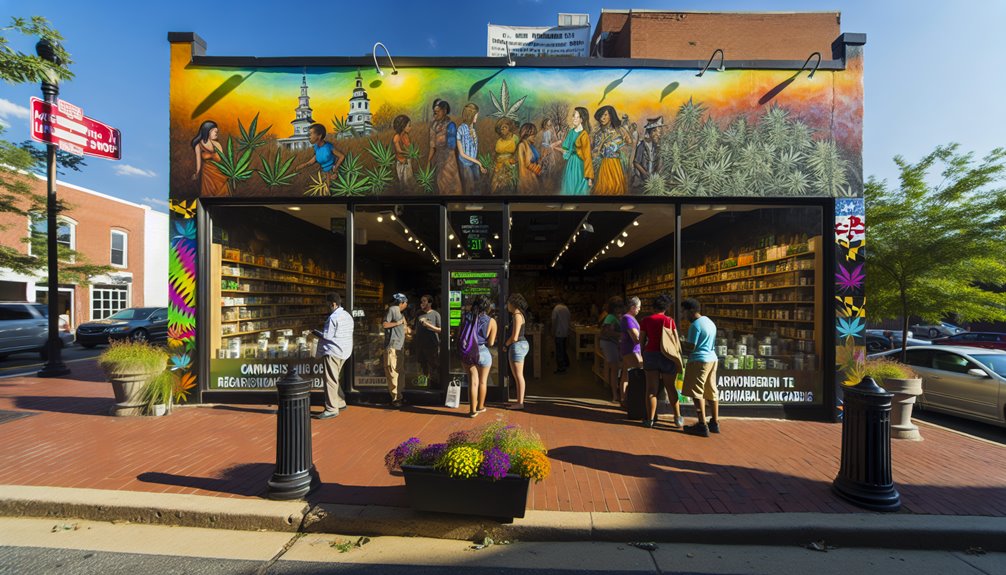
While you may now associate Maryland with progressive cannabis policies, it wasn't always this way. The cannabis history of Maryland is marked by consistent advocacy and gradual policy shifts. In 1988, Baltimore's Mayor Kurt Schmoke ignited a national debate advocating for decriminalization as an alternative to the War on Drugs. Fast forward to 2014, Governor Martin O'Malley signed SB364, decriminalizing minor possession of cannabis. Parallelly, the legalization timeline shows the establishment of medical cannabis in 2013, with the Maryland Medical Cannabis Commission starting to regulate sales by 2017. The path to adult-use legalization began in earnest in 2017 but it wasn't until 2022 that 67.2% of Maryland voters approved the referendum to legalize cannabis. With this, Maryland joined the growing list of states with legalized cannabis. This move towards legalization aims to address the historical failures of criminalization, particularly in marginalized communities, as the new legislation intends to reduce arrests and convictions related to cannabis use.
Understanding the Shift: From Medicinal to Recreational Cannabis
Though Maryland has long recognized the medicinal value of cannabis, the state has recently made a monumental change towards embracing its recreational use as well. This change is expected to stimulate economic growth, create jobs, and generate tax revenue for public services. The legalization also opens up opportunities for cannabis tourism, drawing visitors from neighboring states. However, it's essential to recognize that medicinal cannabis still plays a significant role in the state, serving over 162,000 certified patients. As part of the shift, focus on cannabis education is vital to guarantee users understand the potential effects and benefits of both medicinal and recreational cannabis. This balanced approach guarantees a respectful nod to both the past and future of cannabis use in Maryland. The recent proposal by the U.S. Drug Enforcement Administration (DEA) to reclassify marijuana from a Schedule I drug to a Schedule III, which acknowledges the medical uses of cannabis, can greatly enhance the industry's growth and credibility. Reclassify marijuana is not just about recognition, but also about the potential for increased funding for medical research and reduced tax burdens for cannabis businesses.
The Regulatory Challenges Posed by Recreational Cannabis Use
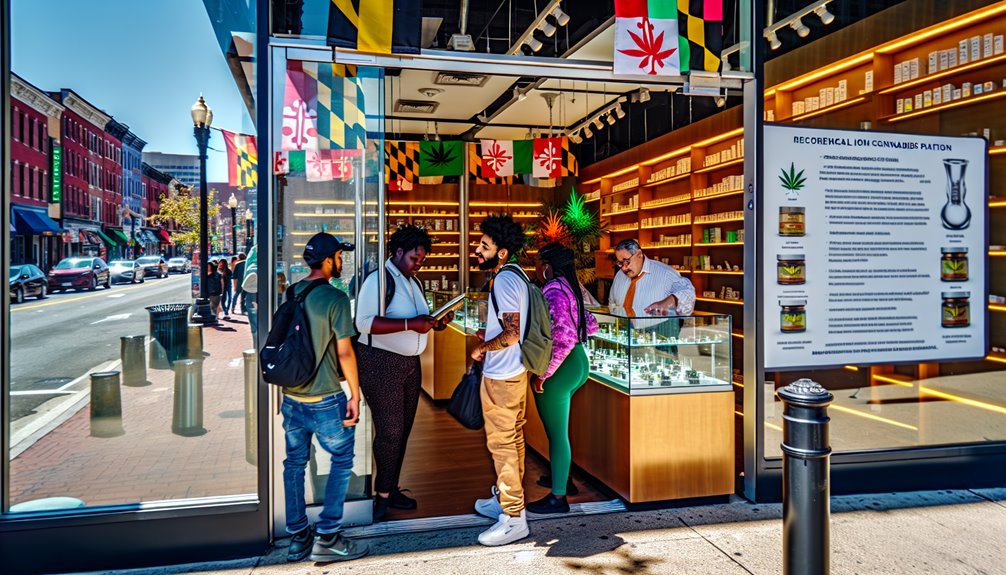
As Maryland shifts towards embracing recreational cannabis use, it's facing a slew of regulatory challenges that require careful navigation.
- Regulatory Compliance: Adherence to stringent rules set by the new Alcohol, Tobacco, and Cannabis Commission (ATCC) is paramount.
- Licensing Challenges: Moving from medical to recreational sales isn't straightforward. Existing dispensaries must pay substantial fees to upgrade their licenses.
- Social Equity Provisions: Ensuring first licenses go to social equity applicants is a complex but necessary task.
- Public Health Partnership: Collaborating with the Maryland Department of Public Health for education campaigns and health impact tracking is crucial.
Your active participation can help overcome these hurdles, ensuring Maryland's shift to recreational cannabis is as smooth and equitable as possible.
Economic Opportunities Tied to Recreational Cannabis
A staggering $14 million in taxes was collected from marijuana sales during the first quarter of 2024, setting the stage for an economic boom tied to recreational cannabis. This promising start is projected to yield over $54 million annually, creating job opportunities for thousands of Marylanders and driving community investment. Jobs are not limited to retail, farming, or logistics, but extend to marketing and even eco-friendly cultivation practices. Importantly, a significant portion of this tax revenue is channeled back into underserved communities, fostering social equity. Your participation in this market doesn't just stimulate economic growth, it also contributes to improving public services and supporting small businesses. Indeed, the shift to recreational cannabis brings widespread economic opportunities.
Public Health Implications of Widespread Cannabis Use
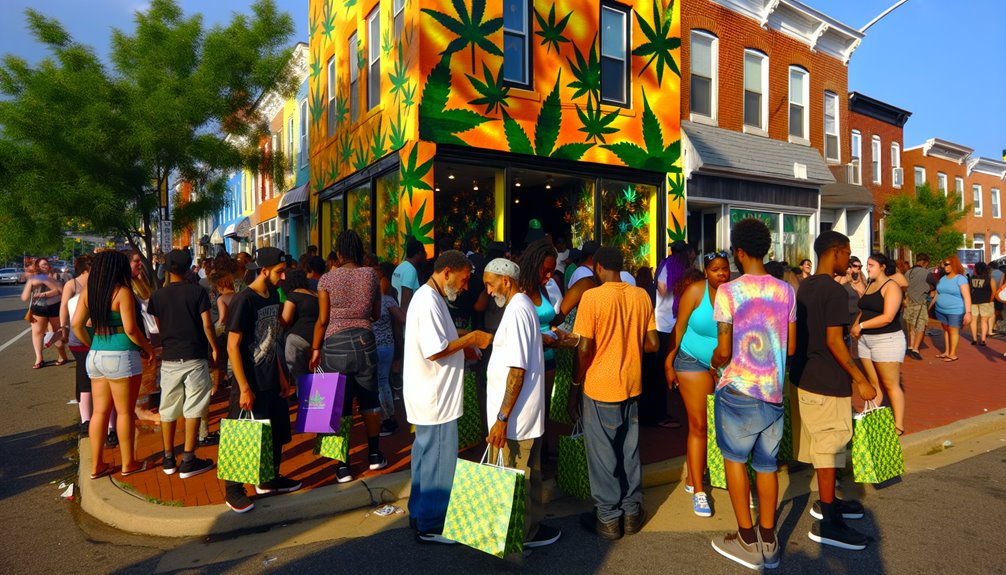
While the economic benefits of recreational cannabis are easy to quantify, understanding the public health implications requires a much deeper analysis. As you navigate this new landscape, consider the following:
- Cannabis health risks: from exacerbating respiratory conditions to increasing myocardial infarction and stroke risks from secondhand smoke.
- Impact on vulnerable populations: Higher rates of cannabis use disorder and health-related harms in marginalized communities.
- Cannabis mental health effects: Short and long-term problems including anxiety, depression, and cognitive impairment.
- Regulatory challenges: Critical need for consistent regulations, data monitoring, and public health policies.
These points underscore that the road to recreational cannabis is not just about revenue but also about managing potential public health implications.
Breaking Down the New Cannabis Legislation
Maneuvering the new landscape of legalized recreational cannabis in Maryland, you'll encounter various pieces of key legislation and regulations. The Maryland Cannabis Reform Act, signed on May 3, 2023, is the cornerstone of this new framework. It establishes a 9% sales and use tax on cannabis sales, generating revenue for the state. The Act also outlines the rules for personal use amounts and penalties for exceeding those limits. It encourages cannabis education, with fines and drug education for underage possession. Additionally, adults can now grow up to two personal-use plants. All sales are to be conducted by licensed businesses, ensuring a controlled, safe marketplace. This legislation marks a significant shift in Maryland's approach to cannabis, reflecting changing societal norms and attitudes.
The Role of Law Enforcement in the Era of Legalized Cannabis
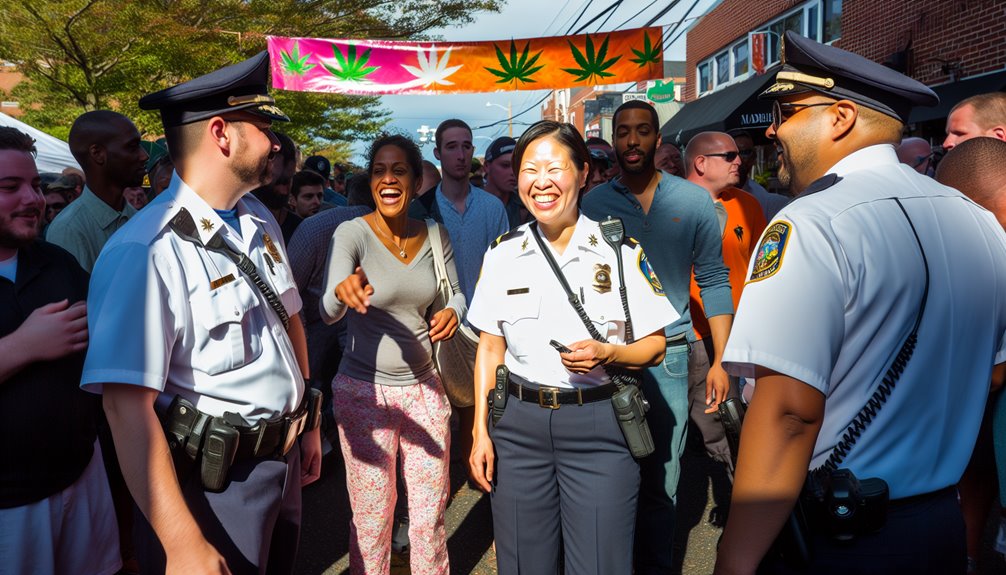
As Maryland embraces the era of legalized recreational cannabis, a significant shift is happening in the role and approach of law enforcement. This change has four major components:
- Law enforcement can't use the smell of cannabis alone as grounds for a search, reducing unwarranted stops.
- The change is designed to tackle racial disparities in traffic stops, serving to build community trust.
- Exceptions remain for impaired driving and offenses like underage possession, ensuring community safety.
- Some law enforcement groups have expressed concerns about ongoing illegal activities linked to cannabis.
Your understanding of these changes will help you better serve your community in this new era of legalized cannabis, fostering trust and ensuring safety.
Public Opinion on the Shift to Recreational Cannabis
Nearly three-quarters of Maryland's voters have spoken: they're in favor of legalizing recreational cannabis. Voter demographics and public perception show that support cuts across geographic and party lines. It's clear that a shared belief in personal freedoms, potential economic benefits, and the therapeutic properties of cannabis fuel this support. Notably, despite strong party lines in gubernatorial voting, cannabis support remained relatively uniform. However, there's also a fair share of opposition, mostly from African American voters and white liberals, who express concerns about the distribution of wealth and the impact on their communities. This shift in public opinion signifies a growing acceptance of cannabis and its potential benefits. However, it also highlights the need to address the concerns raised by those opposed.
Predicted Future Trends in Maryland's Cannabis Industry
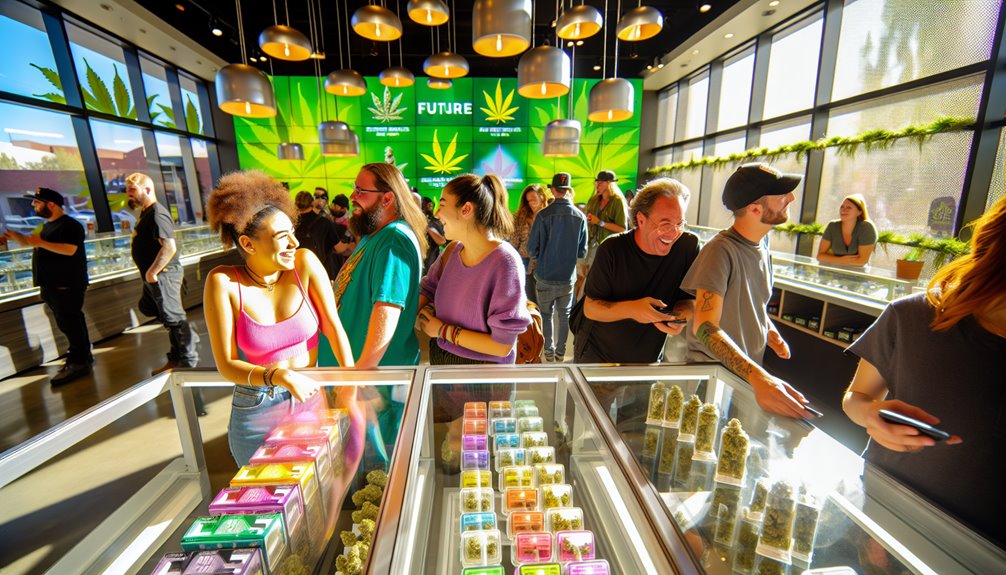
Delving into the projected future trends in Maryland's cannabis industry, it's important to understand the market dynamics, regulatory landscape, and consumer behavior.
- Market Growth: With sales projected to reach over $1.1 billion by 2025, the industry is on a growth spurt. This surge in demand will intensify market competition.
- Regulatory Developments: The Maryland Cannabis Administration plans to release 75 more dispensary licenses, fostering a more competitive market.
- Consumer Preferences: Flower and vape products are currently preferred. However, with the rise in edible consumption, expect a shift in preferences.
- Economic Implications: The increase in sales brings a boost in tax revenue, which will be allocated to support various community initiatives.
Stay informed and prepared to serve your customers better in this evolving landscape.
Conclusion
So, you thought you'd never see the day, huh? Maryland's shift from medicinal to recreational cannabis has surely made some heads spin. It's a wild ride, filled with economic growth, law enforcement challenges, and public health debates. But don't worry, they've got it all figured out. Or so they say. Only time will tell if this green gold rush is a blessing or a bane. One thing's certain though, it sure is a high time in Maryland.
If you're curious about how this change affects you or if you're considering exploring the world of cannabis, I invite you to check out Fells Point Cannabis Docs of Maryland. Their knowledgeable staff can provide you with all the information you need to navigate this new landscape. You can visit them in person or give them a call at (410) 401-4200. They're friendly and ready to help, so don't hesitate to reach out!
